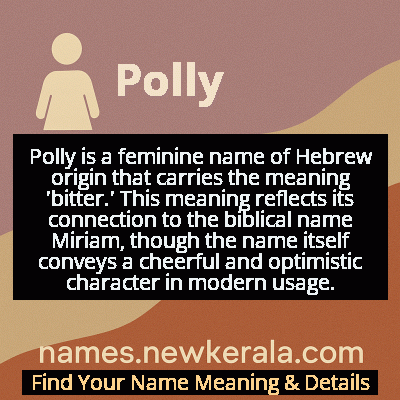Polly Name Meaning & Details
Origin, Popularity, Numerology Analysis & Name Meaning of Polly
Discover the origin, meaning, and cultural significance of the name POLLY. Delve into its historical roots and explore the lasting impact it has had on communities and traditions.
Name
Polly
Gender
Female
Origin
Hebrew
Lucky Number
8
Meaning of the Name - Polly
Polly is a feminine name of Hebrew origin that carries the meaning 'bitter.' This meaning reflects its connection to the biblical name Miriam, though the name itself conveys a cheerful and optimistic character in modern usage.
Polly - Complete Numerology Analysis
Your Numerology Number
Based on Pythagorean Numerology System
Ruling Planet
Saturn
Positive Nature
Ambitious, efficient, realistic, and authoritative.
Negative Traits
Materialistic, stressed, confrontational, and can be overly ambitious.
Lucky Colours
Dark blue, black.
Lucky Days
Saturday.
Lucky Stones
Blue sapphire, amethyst.
Harmony Numbers
2, 4, 6.
Best Suited Professions
Business leaders, managers, financial services, law enforcement.
What People Like About You
Leadership, determination, organizational skills.
Famous People Named Polly
Polly Bergen
Actress and Singer
Won an Emmy Award for her role in 'The Winds of War' and had a successful recording career
Polly Walker
Actress
Known for roles in 'Rome', 'Patriot Games', and numerous British television series
Polly Jean Harvey
Musician and Singer-Songwriter
Two-time Mercury Prize winner and acclaimed alternative rock artist
Polly Draper
Actress and Producer
Known for 'thirtysomething' and creating the children's series 'The Naked Brothers Band'
Name Variations & International Equivalents
Click on blue names to explore their detailed meanings. Gray names with will be available soon.
Cultural & Historical Significance
In American culture, Polly became particularly associated with optimism through the character Pollyanna, whose 'glad game' philosophy influenced the English language itself. The name also appears in numerous folk songs and nursery rhymes, reinforcing its connection to traditional values and simple pleasures. During the 20th century, Polly evolved to represent both traditional femininity and emerging independence, reflecting changing social roles for women. The name's enduring appeal across centuries demonstrates how it successfully balances familiarity with distinctive character, making it a timeless choice that adapts to each generation's values while maintaining its core identity.
Extended Personality Analysis
Individuals named Polly are often perceived as cheerful, optimistic, and socially adept. They typically possess a warm, approachable demeanor that makes them naturally popular in social settings. This outward brightness, however, often conceals a deeper resilience and practical wisdom. The name's Hebrew root meaning of 'bitter' suggests an underlying strength and capacity to handle life's challenges with grace. Many Pollys demonstrate a blend of traditional values with independent thinking, combining nurturing qualities with a quiet determination.
Psychologically, the name Polly suggests someone who is both grounded and imaginative—able to maintain realistic perspectives while still seeing the positive in situations. They tend to be excellent communicators who can bridge different social groups and mediate conflicts. The name carries connotations of reliability and trustworthiness, making Pollys often sought after as confidantes and advisors. Their combination of emotional intelligence and practical problem-solving skills enables them to navigate complex social dynamics effectively. This balance between lightheartedness and depth allows Pollys to form meaningful connections while maintaining their own strong sense of identity and purpose.
Modern Usage & Popularity
In contemporary naming practices, Polly has experienced a revival as a vintage-chic choice, particularly in the United Kingdom and among parents seeking traditional yet distinctive names. While it never completely disappeared, its usage declined in the late 20th century before regaining popularity in the 2010s. The name currently ranks outside the top 500 in the United States but maintains stronger presence in England and Wales, where it benefits from the ongoing trend of reviving Victorian-era names. Modern Pollys often benefit from the name's combination of old-fashioned charm and spunkiness, making it appealing to parents who want something familiar yet not overly common. The name's brevity and cheerful sound align well with current naming trends favoring shorter, vowel-heavy names with positive connotations. Its association with both traditional values and contemporary independence makes it versatile across different cultural contexts and family backgrounds.
Symbolic & Spiritual Meanings
Symbolically, Polly represents the transformation of hardship into strength and sweetness. The name carries the paradox of its Hebrew root meaning 'bitter' while projecting an image of cheerfulness and light. This duality makes it symbolic of resilience—the ability to maintain optimism and grace despite life's challenges. In literary and cultural contexts, Polly often symbolizes innocence tempered by practical wisdom, as seen in characters who navigate difficult circumstances with unwavering hope. The name also carries associations with domesticity and nurturing, yet with an undercurrent of independence, reflecting the historical evolution of women's roles from purely domestic to more self-determined identities. Metaphorically, Polly embodies the alchemical process of turning difficult experiences into personal growth and wisdom, making it a name that speaks to the human capacity for transformation and the finding of light in darkness.

